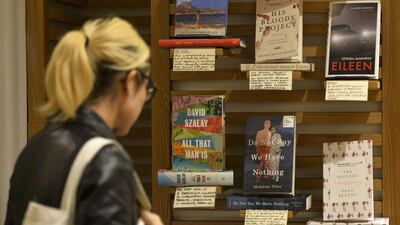It is difficult to overstate the fortune-shifting powers held by the precocious judging panel of the Man Booker Prize. Even being longlisted for the United Kingdom’s largest literary award — this year’s winner will be announced on Tuesday, October 25 — has the power to propel unknown authors to best-selling notoriety.
Gaby Wood, the prize’s literary director, is certainly under no illusions, describing a nomination as “second only to an early death” in the stratospheric effect it has on sales, in a talk at the Frankfurt Book Fair.
This is not hubris, but fact. In an earlier session, Scottish writer Graeme Macrae Burnet told Wood his shortlisted novel His Bloody Project has sold in excess of 50,000 copies. His first novel, The Disappearance of Adèle Bedeau, sold an estimated 2,000.
“I feel slightly embarrassed to say that, in a weird way, I wish the prize were less significant,” said Wood. “A prize is supposed to be an award, not a marketing tool, and for reasons beyond anyone’s control the prize has become a very good way to sell your book — second only to an early death for increasing sales”.
Audience members hoping for any clues about which of the six shortlisted entrants will walk off with the £50,000 prize were left in short shrift, but we did learn from Wood that deciding this year’s winner was reached by a controversial majority, rather than an unanimous consensus. Chaired by historian Amanda Foreman, the other members of the 2016 judging panel are critic Jon Day, previously-shortlisted novelist Abdulrazak Gurnah, poet David Harsent and actor Olivia Williams.
“I said to them at the end of meeting, ‘now you’ve made decision it is the decision of the jury, so stand by it’,” said Wood.
“But I did have a glimmer and a feeling that some of them would go off and [complain].”
Spats among the judges are no novelty, with the award — known before 1992 simply as the Booker Prize — attracting numerous controversies over its 48-year history. In 1993 two of the judges threatened to walk out when Irvine Welsh’s Trainspotting was merely longlisted; the novel went on to become a bestselling critical triumph.
An author and former journalist, who was a guest judge in 2011, Wood has only been in charge of the Booker since 2015, following the death of long-term head Martyn Goff, but has already seen her fair share of back-room wrangling.
“It has happened that people have walked out, people have changed their mind continuously at the last minute, there are people who will not speak to each other because they went to judge the Booker together and could not agree,” she says.
Despite this notorious reputation — and the award’s gleaming profile — recruiting a new panel of celebrity judges every year is far from easy. Wood revealed several writers pass on the opportunity to join the prestigious judging panel because of the immense workload of reading all the submitted entries, which this year numbered 155.
“It’s a book a day, in the period given, and what you find is a lot of writers don’t want to read that many books,” said Wood.
Looking forward, while Wood ruled out nominating poets or rock star memoirs, she offered that the Booker’s board would be open to considering graphic novels. As it stands the prize’s guidelines stipulate an entry must be “sustained” and “unified” — code to disqualify novellas and short story collections (although Alice Munro was shortlisted in 1980 for collection The Beggar Maid).
“Fiction comes in many forms,” adds Wood. “There’s nothing to say [nominating graphic novels] is impossible — but publishers feel there’s a risk submitting them.”
Wood also revealed that while the prize is judged book-by-book — and has previously been won twice by Peter Carey, JM Coetzee and Hilary Mantel — judges are at times biased against awarding the award to previous winner.
“There are some judges who feel an author shouldn’t win twice, they make up their own rules about that privately,” added Wood.
“If a jury in any given year has decided a particular author shouldn’t win twice — they feel ‘we’ve done enough for this person, this person is successful enough’ — that’s something that goes on in the privacy of the judging room.”
rgarratt@thenational.ae

